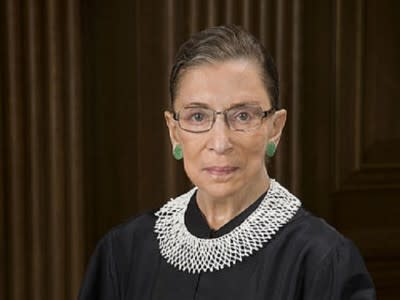Justice Ginsburg on the Supreme Court and societal change
At a National Constitution Center event in Washington last week, Jeffrey Rosen sat down with Supreme Court Justice Ruth Bader Ginsburg to discuss opera, Justice Antonin Scalia, and recent court decisions about civil rights.
Here are some highlights from the discussion between Rosen, who met Ginsburg when he was an opera-loving law clerk 25 years ago, and the Supreme Court Justice:
Rosen: Is it realistic hope that people can strongly disagree about the Constitution and still find common ground and be united?
Ginsburg: I think it is. It was for me and it was for Justice Scalia. When he was nominated, although his views were very well-known, he was confirmed unanimously. It came really close [to unanimous] to for me. It would not be that way today. But don’t you think that is the direction we should return?
Rosen: How can we explain that you do have this friendship and you can disagree constitutionally but be united by love for the Constitution?
Ginsburg: We do revere the Constitution and the institutions it upholds.
Rosen: Everyone wants to know how you can be friends given that you disagree?
Ginsburg: We were colleagues on the court of appeals and one thing about Justice Scalia is that he is a very funny man. Every year they rate us on how many laughs we produce and Scalia is always number one, and I am always number nine. But sometimes he can say things and I have to pinch myself to stop laughing.
Rosen: And you share this love of opera. What did he think of the Scalia/Ginsburg opera that we heard highlights from tonight?
Ginsburg: I think he enjoyed it very much, particularly the tribute to his father in the Aria.
Later, Rosen and Justice Ginsburg talked about past cases involving the Family Medical Leave Act, how it affected the late Chief Justice William Rehnquist, and how the Supreme Court deals with societal changes in its actions.
Ginsburg: In this case in the Family Medical Leave Act it was easy because it was a law passed by Congress and Congress’ authority was challenged outside the domain of the federal government. So the Chief was explaining why this law was national business, was a matter that the national government had the authority to deal with.
Rosen: There are cases that are harder. You courageously and presciently but controversially said that at the time that Roe v. Wade was too broad and it should of decided the narrower question in the case.
Ginsburg: It was a surprising decision in this way. Roe v. Wade was not controversial when it was decided. It was a 7-2 decision. My criticism of it was that it moved too far, too fast. It was the first right-to-choose abortion case the Court had. And a single decision of the Court made every law [related to abortion] in the country unconstitutional, even the most liberal laws providing access to abortion. So the Court took care of it all, instead of moving and dealing with the case before it.
Rosen: Is it your argument, you’ve been called a judicial minimalist, that the Court should always take baby steps even when it’s reflecting social change?
Ginsburg: Sometimes, in the aftermath of Brown v. Board when there was out and out refusal to follow the law of the land. It is not just the Supreme Court, it is was … in the trial courts and the courts of appeals who insisted that the law of the land said no forced separation of the races in school. Some of them, their lives were in jeopardy, but they enforced the decision.
Rosen: What does Brown mean today and is there agreement about the core meaning?
Ginsburg: The culmination of the civil rights cases that led up to Brown came 13 years later in 1967 in Loving v. Virginia. It was the story of a couple that grew up in the rural area of Virginia where people got along with each other. … So Mildred and Richard Loving came to D.C. to get married because they couldn’t get married in Virginia. They went back to Virginia. One night the sheriff comes to their home with a flashlight and said, “get out of bed and come with me to see the judge.” They pointed to their marriage certificate which they had framed and he said, “that doesn’t count for anything here.” So the judge said he would not sentence them to prison if they agreed to leave the state of Virginia and never come back together. Then the civil rights movement and Martin Luther King were very important in the country. And Mildred Loving thought that maybe there was hope the system would work for her. So they brought the case and it ended again with a unanimous decision in Supreme Court in 1967. The Loving v. Virginia decision is when apartheid in America ended, not with Brown.
Recent Constitution Daily Stories
Supreme Court ponders if police can search your cellphone without a warrant
The latest controversy about Under God in the Pledge of Allegiance



